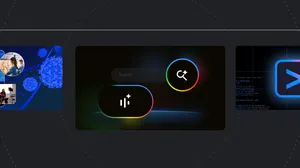This Googler wants to ‘add every voice’ to AI

Early in his career, Laurence Moroney was working on an equation — not something related to his job in tech, but to his bank account. “At one point, I calculated I was about three weeks away from being homeless,” Laurence says. “My motivation was to put a meal on the table and keep a roof over my head.”
Today Laurence is a developer advocate at Google focusing on artificial intelligence (AI) and machine learning (ML). “It’s my goal to inform and inspire the world about what we can do with AI and ML, and help developers realize these possibilities.” Laurence applied at Google in 2013 after hearing then-CEO Larry Page talk about Google’s vision to make the world a better place. “I was hired on my third attempt — so yes, I failed twice!”
Now he focuses on inviting and introducing more people to roles in the AI and ML fields through coursework, workshops and bootcamps that help developers gain job skills through professional certificates. “I try to meet developers where they are, whether that’s on YouTube, social media or in-person events,” he says. He’s particularly motivated to reach out to groups who have been historically underrepresented in tech. “Often they look and see everyone is one ethnicity and one gender and they think they don’t belong, but that’s not the case: Everyone, all ages, disabilities, whatever your background is, you should be here,” he says. “It's so important for AI and ML work to include the entire scope of people which is why I'm so motivated to try and make everyone feel like they belong in this work.”
But it wasn’t an easy or straightforward path: his early years were tumultuous. Originally from Cyprus, Laurence and his family were forced to leave their home when a civil war resulted in an invasion. Exposure to chemicals used in the war zone permanently stained Laurence’s teeth, and he was also left with shaky hands. After moving to four different countries before the age of 8 (and learning four different languages), they settled in Ireland. “When you’re young, you don’t notice how difficult these things are, you just think…this is your life and this is normal,” he says.
He didn’t have the luxury to find his “passion” at work. “I needed a job and I needed a career. And around that time, the internet was starting to open up all of these new possibilities and opportunities.” In 1992, while bouncing around between odd jobs after receiving his degree in physics, Laurence heard about a government AI training program in the U.K. — one that worked as a sort of fellowship helping participants earn their master’s degree while also working on ways that AI systems could benefit the country.
“Hundreds of people descended on the testing center, where they looked at things like IQ, reasoning skills and so on,” Laurence says. Laurence also went — and ended up with the highest score. “They signed me up without realizing my background or ethnicity, and I was glad for that because I had experinced a lot of discrimination for being Irish,” he notes. “By that time I had gotten in the habit of disguising my accent. I tried not to talk much when I spoke to the government official who was running the program.” Despite his nerves, Laurence was asked to be the first person to sign on…though, the program itself was short-lived.
“Isaac Asimov is my favorite writer and he has this line that says, ‘In a good cause, there are no failures, only delayed successes.’ And in this case, unfortunately, that was also true,” Laurence says. This effort was remarkably ahead of its time, which meant it was still too early for AI to be applied very practically — but the contract Laurence had signed included paid-for extended education, so he was able to use this scholarship to get his master’s in systems specifications and design.
It was around this time Laurence decided to move to the U.S., where the tech industry was booming. Initially he worked in New York eventually relocating to Seattle, and eight years ago took a job with Google, which grew into the role he’s in today.
Today Laurence is passionate about making sure people everywhere know they can be a part of the AI and ML revolution — and not only because people are needed to create new products and systems, but because more voices are necessary to this work. “Every voice we add enriches what we’re doing — and every voice we lose diminishes it,” he says. “A cynical person might say businesses just want to check off diversity boxes, but for us, it’s not a box to check. It’s a huge opportunity for what we’re creating to be so much better.”
Laurence partnered with Andrew Ng at deeplearning.ai to teach millions of people how to use ML. Here they are in action, having way too much fun trying to design a neural network.








